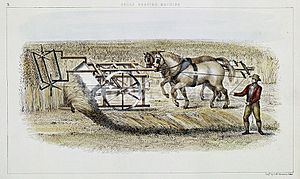Patrick Bell facts for kids
Patrick Bell (born May 12, 1799, died April 22, 1869) was a Scottish minister and a clever inventor. He is best known for creating an important machine that helped farmers harvest their crops much faster.
Contents
About Patrick Bell
Patrick Bell grew up in a farming family in Auchterhouse, Scotland. He decided to study to become a minister at the University of St Andrews. From 1843 until he passed away, he served as the minister for the Carmyllie parish.
The Reaping Machine
While working on his father's farm, Patrick Bell invented the reaping machine. He was very interested in how things worked. This led him to build a machine that could cut crops using horse power. It was designed to make harvesting much quicker.
In 1828, his new machine was successfully used on his father's farm. Other farms in the area also found it very helpful.
How the Machine Worked
Bell's reaping machine had a spinning reel with 12 parts. This reel pulled the crops towards a cutting knife. The knife had triangular blades that moved back and forth. These blades cut the crops against other fixed blades. After being cut, a moving canvas belt carried the grain and stalks to the side. This created a neat row of cut crops. The machine was pushed by animals, like horses, and ran on two wheels.
Sharing the Invention
Patrick Bell never asked for a patent for his reaping machine. A patent would have given him the only right to make and sell his invention. As a man of faith, he believed his invention should help everyone. Because of this, he never made any money from his machine, even though it became very successful around the world.
Other Inventors
Other inventors later created similar machines. In the United States, William Manning received a patent for a reaper like Bell's in 1831. Obed Hussey also got a patent for a similar cutter in 1833. Cyrus McCormick patented his own vibrating cutter in 1834. McCormick and his brothers built many of these machines. Their company later became the famous International Harvester Company.


